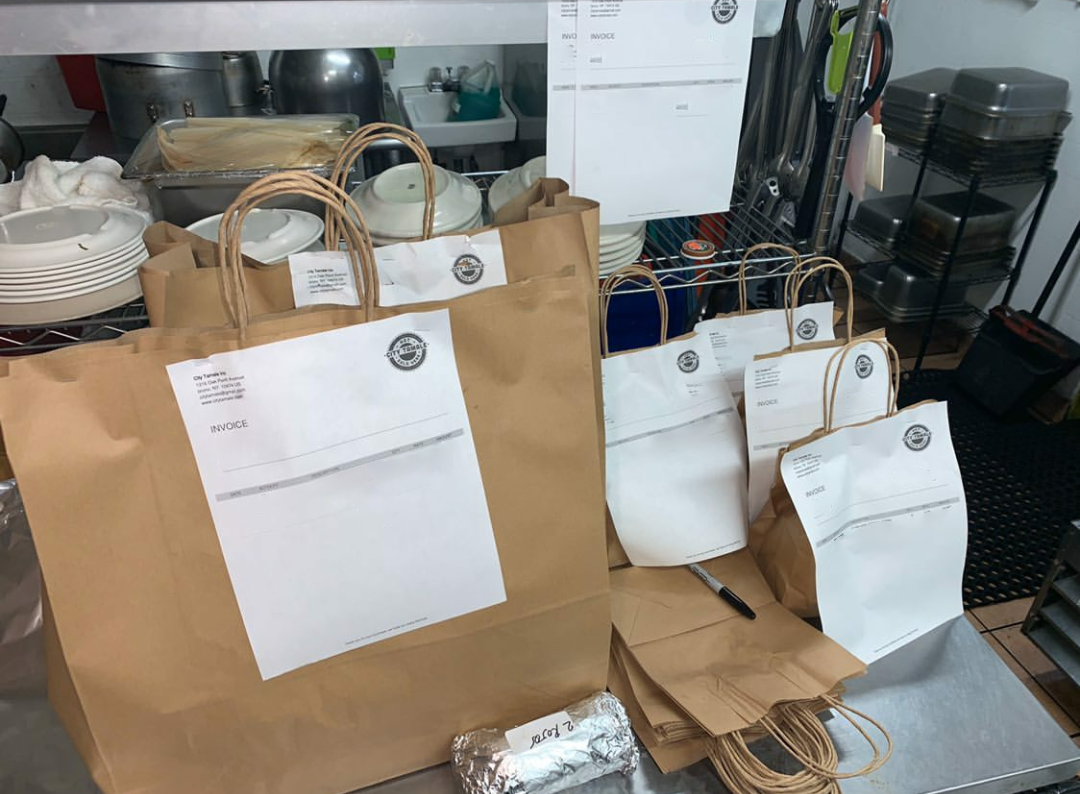For a couple of weeks after COVID-19 began tearing through New York City, it was hard for Israel Veliz, the owner of City Tamale in Hunts Point, to get a hold of masks and other protective equipment for his staff.
Eventually he was able to find supplies locally, at Victory Food Services. But he realized he was on his own in figuring out how to protect his staff and delivery crew while he struggled to keep the doors of his Oak Point Ave. business open.
“It doesn’t really feel safe out here, but then again we can’t close, or we may never reopen.”
As hospitals continue to grapple with shortages of protective equipment, some local food services said they have received no assistance in acquiring masks and other protective equipment to hand out to their employees. With restaurants relying heavily on deliveries to help keep their businesses open, many fear they could be putting their delivery workers at risk.
Since the New York stay-at-home order went into effect, City Tamale has seen its sales drop more than 50%, forcing Veliz to close his newly opened Manhattan location and lay off half of his staff.
Veliz himself took on the role of the restaurant’s delivery driver and extended his delivery area significantly to keep his business open. He drew up his own safety protocols, handing out gloves and masks to his workers and disinfecting the restaurant as much as possible with cleaners like Clorox.
Veliz even set up a Go Fund Me page to help pay workers, but also to buy cleaning supplies and other equipment. Like many other restaurants around the city, City Tamale now only offers a delivery or pickup option in an effort to minimize contact with customers.
Recently, Veliz said, City Tamale received a loan of $8,000 from the Small Business Association that was used to cover the restaurant’s rent for March and April.
Despite the fall in revenue and health concerns, Veliz said closing City Tamale is not an option.
Angel Nunez, the manager of a C-Town Supermarket in Mott Haven shared the same concerns about safety and said that closing is not an option for him or his 30 employees, either.
On a busy day, his workers might make an average of 100 grocery deliveries. Delivery orders can’t be made online for his market, so customers, who now oftentimes walk out of the store with 10-15 overflowing grocery bags will ask for help — a service Nunez says his workers are still happy to provide.
Since the deliveries are done on foot, employees will normally not go any further than three or four blocks away from the supermarket. However, Nunez worries they could still potentially be introduced to the virus while they are out.
Nunez, too, said the supermarket has received no support or guidelines from the government, even as it tackles the vastly increased demand for groceries and deliveries.
“We don’t even know what kind of chemicals we can use,” said Nunez. “We serve food, so we have to be careful about any kind of chemicals we are going to use to sanitize the supermarket, to prevent the spread of the disease inside our store.”
Nunez said he has been doing everything he can to make sure that his workers stay safe, but he worries that as the pandemic continues, he won’t be able to do enough. The store now only has a handful of masks or gloves for workers to use.
Employees for delivery services like DoorDash, Uber Eats and Postmates also face the issue of having to find ways to protect themselves on their own.
While the online ordering services have sent out daily emails to their workers with updates and information on the procedures and protocols relating to the pandemic, many delivery workers have been left to find protective equipment on their own.
Yanii Major, who delivers for Postmates as a side gig, said she has been taking every precaution she can to make sure she doesn’t get sick, and has been monitoring her health.
Major, who works full time caring for clients with disabilities in a group home setting, said she carries with her a box of disposable gloves she received from her full time job. The group home has also started recording temperatures of all employees during their shift, and that provides her some confidence she’s still healthy.
Postmates, along with other delivery services, has agreed to provide up to 14 days of paid sick leave to drivers diagnosed with Coronavirus or if they have been directed by a doctor to self-quarantine. The drivers accounts will be suspended during those 14 days of paid sick leave.
These delivery services have also implemented a contactless delivery option to encourage social distancing. This option allows for the delivery worker to just drop off the food by the customer’s door without having to interact directly with the customer.
“I have hand sanitizer and as frequently as I can, I stop inside the restaurants I deliver for and wash my hands in the bathroom, if that place has a restroom available,” said Major. “Honestly, the only thing I can do is take the proper precautions, but I don’t worry.”

